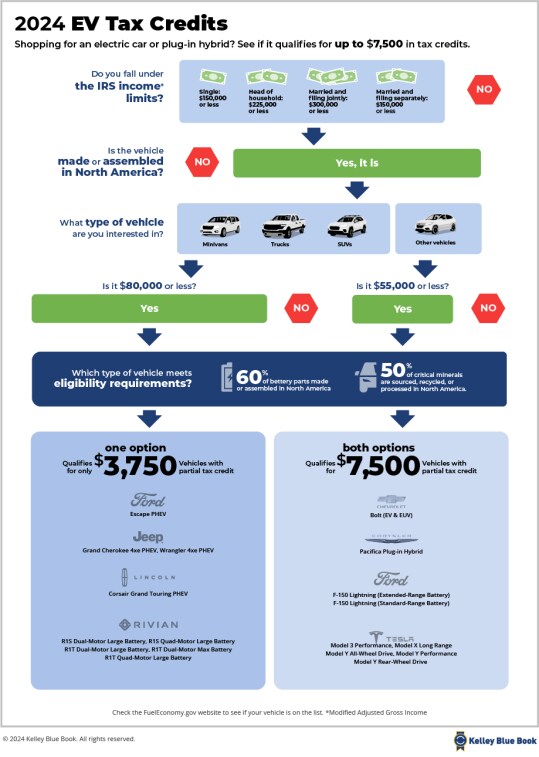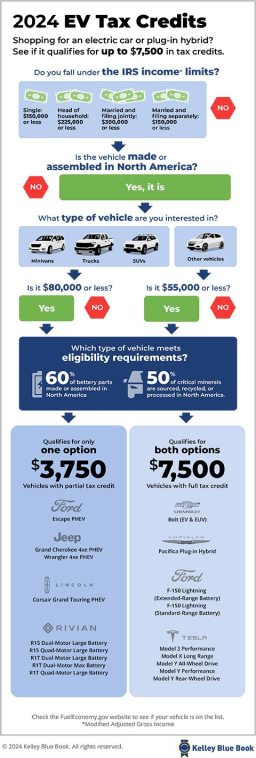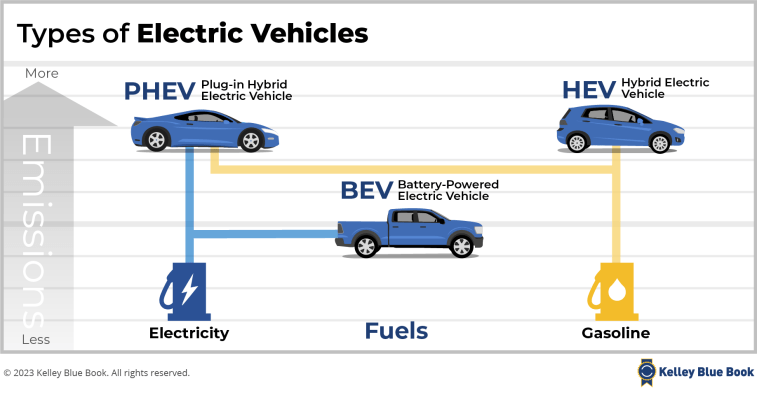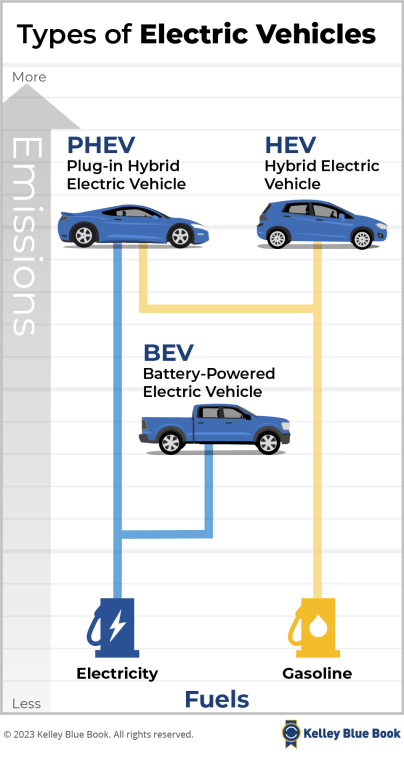Quick Facts About Federal Incentives for Electric Cars
Consumers considering a new electric vehicle or plug-in hybrid can now obtain instant tax rebates of up to $7,500 on select models. Fewer electric car models qualify when compared to last year, and income guidelines still apply. So, read on to find out if federal tax incentives will help you defray the cost of buying a zero-emission vehicle when combined with state and local rebates.
How the New EV Tax Credits Work
The federal EV tax credit, part of the Inflation Reduction Act of 2022, is a nonrefundable tax credit that can lower taxpayers’ costs of EV ownership.
According to Kelley Blue Book research, electric car buyers spent an average of $56,575 for a new EV in August 2024 (the most recent figures as of this writing), down 1.2% from a year ago. The industrywide average price, including gas-powered vehicles and electric cars, fell for the 11th consecutive month to $47,870.
Here’s how the electric vehicle tax credits work in 2024 (as of this writing):
- Discount upfront. In 2024, dealerships can offer instant EV tax rebates to qualifying customers on qualifying vehicles who can use them as down payments at the time of purchase. According to IRS regulations, tax credits must be initiated and approved at the time of sale. The regulations also say that buyers must obtain a copy of the IRS’ confirmation that the dealer successfully submitted a “time of sale” report. Read more about IRS publication 5900. See the full list below.
- Credits up to $7,500. The Inflation Reduction Act allows up to $7,500 in tax credits for select new electric cars, plug-in hybrids, and hydrogen-powered vehicles that meet government qualifications. The federal government continues to update the list of qualifying vehicles.
- Caps EV price tags. The incentives restrict qualifying vehicles to low-emissions trucks, SUVs, and vans with manufacturer’s suggested retail prices (MSRPs) of up to $80,000 and cars up to $55,000.
- New electric vehicle income caps. The rebates are limited to individuals reporting adjusted gross incomes of $150,000 or less on taxes, $225,000 for those filing as head of household, and $300,000 for joint filers.
| IRS Tax Filing Status | Adjusted Gross Income Limits |
| Single | $150,000 |
| Head of household | $225,000 |
| Married and filing jointly | $300,000 |
| Married and filing separately | $150,000 |
- Used electric vehicle rebate. Anyone considering a used electric car under $25,000 could obtain up to a $4,000 tax credit, subject to income and other limits. The IRS says the credit equals 30% of the sale price up to a maximum credit of $4,000. To qualify, used cars must be at least two model years old. The vehicle also must be purchased at a dealership. The vehicle also only qualifies once in its lifetime. Purchasers of used vehicles can only qualify for one credit every three years, and to qualify, individuals must meet income requirements (see below). The credit ends in 2032. Read about used EV tax credits: Used Electric Car Tax Credits Explained for 2024.
| IRS Tax Filing Status | Adjusted Gross Income Limits |
| Single | $75,000 |
| Head of household | $112,500 |
| Married and filing jointly | $150,000 |
| Married and filing separately | $75,000 |
- Leased vehicles may qualify. The IRS lets dealers claim credits of up to $7,500 on cars available for lease. Dealers, in turn, can apply that amount to the price of the vehicle before setting lease terms, effectively lowering the cost to shoppers.
- Rules on EV battery manufacturing. To qualify for the subsidy, an electric car’s batteries must have final assembly in the United States, Canada, or Mexico, and the batteries’ minerals and parts must also come from North America to qualify. These rules render many electric vehicles ineligible. Last year, the U.S. Treasury Department updated regulations that govern where battery minerals and parts must be sourced. Currently, the rules require 60% of battery content from such countries and ladder up to 80% in 2027. The department will use a similar, 3-part test to decide whether cars have met mineral standards. In 2024, 50% of critical minerals must be recycled, sourced, or processed in North America.
- Home electric car chargers and installation costs get a rebate. Federal incentives include a 30% tax credit up to $1,000 for electric car chargers and installation costs. The tax credit extends through Dec. 31, 2032. To claim your credit, use IRS form 8911 and file with your federal tax returns. Some states and utilities also offer separate incentives. Read more on that below.
List of Electric Vehicles That Qualify
The U.S. Internal Revenue Service released its newest list. So far, we know the following updates to the tax credits starting Jan. 1, 2024. As the IRS updates the list of qualifying vehicles, we will update ours.
GM paused Chevrolet Bolt EV and Bolt EUV production in December 2023, but those vehicles from model years 2022 and 2023 are still eligible for the tax credit. Some new Bolt vehicles remain on dealer lots, and you can get a great deal if you find one. The starting MSRP on those models is less than $29,000 before the tax credit.
The list of EVs eligible for the tax credit in 2025 is forthcoming. One likely addition is the Hyundai Ionic 5, which is manufactured in Georgia. This fully electric car is expected to qualify for half of the full tax credit.
State and Local Incentives Near You
Though the federal government’s effort makes up the lion’s share of government EV discounts, some states and local governments offer incentive programs to help new car buyers afford something more efficient. These can be tax credits, rebates, reduced vehicle taxes, single-occupant carpool-lane access stickers, and registration or inspection fee exemptions.
States like California and Connecticut offer broad support for electric vehicle buyers. However, Idaho and Kentucky are among the states offering no support to individual EV buyers.
Your Electric Utility May Help
Lastly, it’s not just governments that can help you with the cost of a new EV. Some local electric utilities provide incentive programs to help buyers get into electric vehicles. After all, they’re among the ones that benefit when you turn your fuel dollars into electricity dollars.
Some offer rebates on cars. Others offer discounts on chargers or install them for free when you sign up for off-peak charging programs.
For example, Rhode Island offers up to $1,500 to residents who purchase or lease a qualified new battery electric vehicle. The state also rebates up to $1,500 more to purchasers who qualify based on income eligibility.
Electric Car Guides:
Editor’s Note: This article has been updated since its initial publication.





